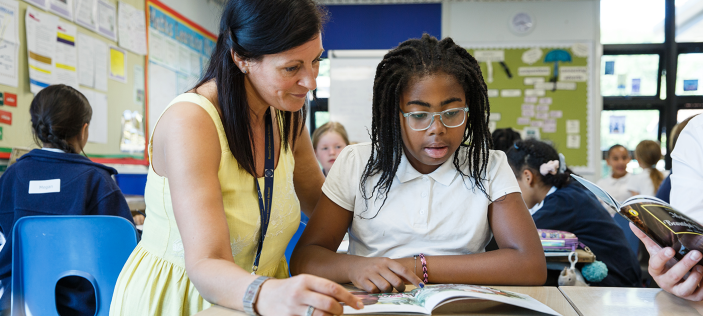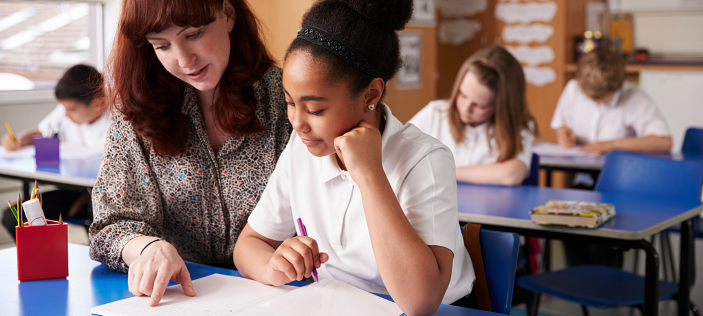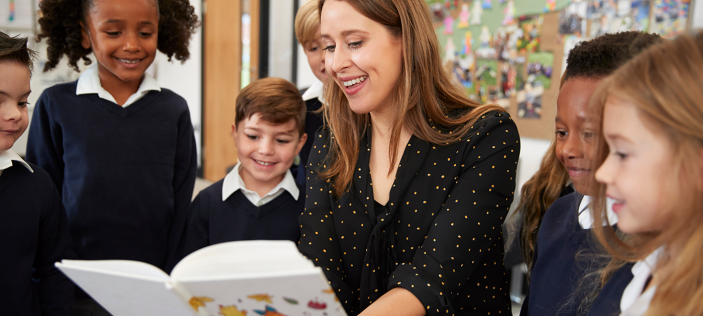Catherine Root is Literacy and Reading Recovery Lead at Stationers' Crown Woods academy, a large academy based in Greenwich, southeast London. Catherine participated in the KS3 Reading Fluency Project in summer 2021 and implemented the strategies with students in years 7 and 8 who were struggling with reading accuracy and comprehension.
I was looking for the Holy Grail - the quest that every school Leadership team has: to find something that would close the literacy gap. Having been an English teacher for 23 years and a senior leader for 13 of these, I had seen ‘literacy’ float around school agendas in a pretence of its significance but in truth anything being actioned having very little real impact. ‘Word of the Week’ may have been displayed in every classroom, students might have access to a well-stocked library, key word lists might well be distributed and displayed but the stark reality was that these things, while ticking boxes, had very little influence on improving students’ literacy levels, even less so for those who had already fallen behind. Worse still perhaps was ‘literacy intervention’ which although undoubtedly offering reading time and pastoral support, also fell short of a high energy, high impact measurable strategy to really close the gap.
Returning from maternity leave, I started a new part-time role as Literacy Lead at a 1700 strong academy in Greenwich. The main part of this work was to review literacy provision across the school and to launch some reading recovery programmes. As I met the pupils, my heart ached for the students in front of me, whose level of reading was so poor that not accessing their Geography lesson was the least of my worries for them. How do they navigate the world on a daily basis? Read a bus timetable? Send an email? Read instructions? How will they apply for job? Be able to revise for their driving theory test? Do something that an employer requests of them? In most cases, these children have learnt to cleverly mask their weakness in reading - even more dangerous in the classroom where busy teachers think they understand but do not realise how little they have really grasped.
I wanted to fix it; to put it right once and for all; to find that intervention that would really work!
I looked at various programmes, all of which had merit but all were also tagged as ‘moderate’ in impact. Some were phonics focused but my issue was students who could, on the whole, decode successfully but had somehow stopped developing and reading so that their comprehension and vocabulary was weak. Many of the programmes that seemed written for them were perhaps a little dry in content and structure and although I found a few things I thought might be useful, I still couldn’t find the short, intensive, quick-burst intervention programme that I was looking for until a chance conversation with a Primary school teacher friend. She had been on the one-day Herts For Learning Reading Fluency Project training and said she had experimented with some of the ideas, finding that they had impact.
Booking myself on to the overview training to get a flavour, I had no idea what to expect, hoping I suppose to see something brilliant, expecting perhaps to go away disappointed. What I got was definitely the former and it led me to sign up for the full project.
The Fluency Project offers a completely fresh approach to reading intervention. Incorporating a range of powerful strategies, including group echo reading, it is a truly refreshing experience. Initially I was hesitant about how the group read would go down with ‘teens’. I could see it working with KS2 students but how would those on the edge of teenagerdom cope? Would they be too self-conscious or disengaged for it to work? In reality, this was not an issue. The HfL team had recommended to just ‘go in’ with energy, pace and an expectation that everyone would join in and this really worked. It did take a bit of time to train the students to track the text but they picked it up and they really loved the power of having a pencil and ‘text marking’ as we read.
For KS3 colleagues there are challenges of navigating a KS3 timetable. Who delivers it? When do they do it? Which lessons should students miss in order to attend? I was adamant that I was not going to take boys out of PE as I thought this would do little for their motivation! Although we used both tutor times and lessons, it definitely worked best for us in lesson time slots as it felt less rushed. However, it was still successful in tutor times if that is all the time you have! You have to be stringent in the expectation that this is twice a week for 8 weeks but if you can get your headteacher to back it, then that is all that is needed. In reality, I got no resistance from teachers; all saw that this was a priority. Consistency was really vital and it does have to be a non-negotiable: students must never be pulled out of reading group because of something else!
And so, we came to the end of our first round; had it worked? I’d heard of the successful figures that had been cited in other schools but was it the ‘treasure’ I had been hoping for?
Absolutely! The students loved it and many were genuinely sad that the group had come to an end. Their increase in confidence was palpable and their willingness to read aloud more obvious. Some students re-engaged with independent reading, one girl saying ‘I didn’t read because I thought I couldn’t but now I have learnt that I can I have started to read the books that my mum has been buying me.’ The intervention itself was fun and easy to deliver. You definitely need to prepare the echo reading in advance and the choice of text is really key but there was something genuinely enjoyable about having to use my own inner voice to perform and read with them. The progress data showed them making gains beyond which I ever thought possible. Furthermore, English teachers have commented on the difference in the engagement and comprehension skills in class of students in the groups.
I am not claiming to be the finished Indiana Jones but I do feel that the Fluency Project has moved me further on in my quest. I am not under any illusion that the gap for these students is permanently fixed. However, we are certainly now on the way. The challenge is to now take what students and I have learned into teaching in all classrooms across the school so that the progress they have made is not lost but built on and allowed to grow further.
The quest continues…
With thanks to Catherine Root for contributing this blog. We hope that KS3 colleagues find it useful and insightful.
For further details about the project HFL Reading Fluency Project


